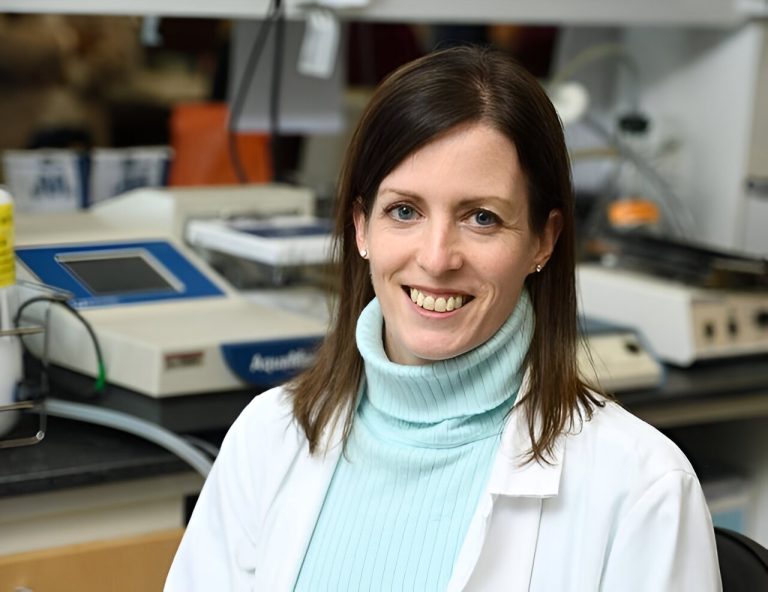Eileen Scully.Credit: Johns Hopkins Medicine
× close
Eileen Scully.Credit: Johns Hopkins Medicine
Early in her career, Eileen Scully, a physician and scientist at Johns Hopkins University, began investigating how viral infections such as HIV, SARS-CoV-2, and tuberculosis manifest differently in different people. I did. Her particular interest is in the differences between biological men and women in how HIV is transmitted and progresses.
“When HIV was first identified in the 1980s, only a handful of women were confirmed to have the virus,” says Scully, an associate professor in the Division of Infectious Diseases. “The early understanding of this disease and the early testing of what we could do was almost entirely done by men.
“However, of the more than 39 million people currently living with HIV around the world, 51% are women or girls.”
He said research has shown that HIV infection is influenced by sex-based anatomical differences, the mucosal microbiome, and sex-based health behaviors, as well as gender-specific responses to preventive vaccines in development. states that it is possible.
And she has become one of the nation's strongest advocates for including gender as a biological variable in preclinical and clinical studies examining the onset, progression, and treatment of infectious diseases.
“There is a need to use male and female animals in model systems and to ensure that sex-stratified results are clearly reported,” she wrote. natural microbiology “We must also report the gender of cells used in in vitro studies, and we must find ways to ethically include more cisgender and transgender women in clinical trials.”
Scully, who has been practicing at Hopkins since 2016, treats HIV-infected patients in the John G. Bartlett Specialty Clinic, while conducting “bench-to-bedside” research in the Basic Science Laboratory. We are conducting an intervention trial to provide this service to patients. She also serves on the U.S. Department of Health and Human Services' Panel on Antiretroviral Guidelines, which evaluates treatment options for HIV.
Some of her research investigates how men's and women's immune systems work differently.
Although protection against pathogens is a key feature of the immune response, women have evolved to be able to tolerate genetically different fetuses and transfer protective immunity through breastfeeding. Scully says this highlights how biological sex shapes the immune system.
“With that in mind, it makes sense that no two programs would be exactly the same on how to respond to a pathogen, even if the overall goal of surviving infection is the same,” she says.
With HIV, there are multiple examples where men and women respond differently. Women have lower viral loads if untreated, but progress to immunodeficiency and AIDS at a similar rate. Women are also more likely to be among the rare individuals who can control their HIV without treatment. The reasons for these differences are not yet known, but they may provide important clues about how to halt HIV disease progression.
People who receive effective HIV treatment are now able to live longer, healthier lives and protect their partners. Current research focuses on treating the infection, which requires eliminating the reservoir of HIV. This reservoir is made up of immune cells that retain copies of the HIV genome but do not actively produce new HIV. Scully's previous research suggests that the reservoirs are different in men and women, and that estrogen may have a direct effect on the HIV reservoir. Following data identifying estrogen as a modulator of HIV latency, Scully, through the Advancing Clinical Therapeutics Globally (ACTG) network, is researching the effects of estrogen receptor antagonism in combination with HIV latency reversing agents. I will design and lead a clinical trial to test this.
This study was the first cure trial designed exclusively for women, dramatically increasing female participation in HIV cure latency reversal trials. The research team also conducted a social science survey of trial participants to understand why women participated in the study and to inform efforts to include more women in future trials.
Ongoing research is focused on identifying the mechanisms of estrogen's effects on HIV incubation period and investigating the impact of biological sex on SARS-CoV-2 and other infectious diseases such as tuberculosis .
“We're excited about this study because we start with clear clinical observations of the differences and then work to uncover the underlying pathways,” Scully said. “By examining the gender-specific characteristics of the immune response, we can think about how to tailor treatment approaches to each individual, moving us closer to precision medicine.”


